|
|
|
Sort Order |
|
|
|
Items / Page
|
|
|
|
|
|
|
| Srl | Item |
| 1 |
ID:
128874
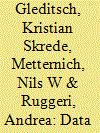

|
|
|
|
|
| Publication |
2014.
|
| Summary/Abstract |
We highlight how efforts to collect systematic data on conflict have helped foster progress in peace and conflict research. The Journal of Peace Research has played a key role in these developments, and has become a leading outlet for the new wave of disaggregated conflict data. We survey progress in the development of conflict data and how this interacts with theory development and progress in research, drawing specifically on examples from the move towards a greater focus on disaggregation and agency in conflict research. We focus on disaggregation in three specific dimensions, namely the resolution of conflict data, agency in conflict data, and the specific strategies used in conflict, and we also discuss new efforts to study conflict processes beyond the use of violence. We look ahead to new challenges in conflict research and how data developments and the emergence of 'big data' push us to think harder about types of conflict, agency, and the 'right' level of aggregation for querying data and evaluating specific theories.
|
|
|
|
|
|
|
|
|
|
|
|
|
|
|
|
| 2 |
ID:
142114
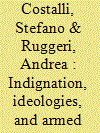

|
|
|
|
|
| Summary/Abstract |
Ideas shape human behavior in many circumstances, including those involving political violence. Yet they have usually been underplayed in studies of the causes of armed mobilization. Likewise, emotions have been overlooked in most analyses of intrastate conflict. A mixed-methods analysis of Italian resistance during the Fascist regime and the Nazi occupation (1943–45) provides the opportunity to theorize and analyze empirical evidence on the role of indignation and radical ideologies in the process of armed mobilization. These nonmaterial factors play a crucial role in the chain that leads to armed collective action. Indignation is a push factor that moves individuals away from accepting the status quo. Radical ideologies act as pull factors that provide a new set of strategies against the incumbent. More specifically, detachment caused by an emotional event disconnects the individual from acceptance of the current state of social relations, and individuals move away from the status quo. Ideologies communicated by political entrepreneurs help to rationalize the emotional shift and elaborate alternative worldviews (disenchantment), as well as possibilities for action. Finally, a radical ideological framework emphasizes normative values and the conduct of action through the “anchoring” mechanism, which can be understood as a pull factor attracting individuals to a new status.
|
|
|
|
|
|
|
|
|
|
|
|
|
|
|
|
| 3 |
ID:
174769
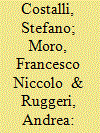

|
|
|
|
|
| Summary/Abstract |
What causes civilian victimization in conventional civil wars and in conventional wars that experience insurgencies? The authors argue that a key driver of civilian victimization is the vulnerability of the incumbent forces, specifically when the conflict’s front line is shifting. Vulnerability is a function of informational and logistical challenges: when the front line is moving, incumbents face increased informational uncertainty and unstable supply chains that augment their vulnerability. Thus, incumbents will increase the use of civilian victimization in response to a scarcity of high-quality information on the location and identity of insurgents, to limit possible information leaks, and to contain supply disruption and logistics support to adversaries. The authors support their argument using matched difference-in-differences analyses of original subnational data on Nazi-Fascist violence in World War II Italy (1943–1945) and qualitative evidence.
|
|
|
|
|
|
|
|
|
|
|
|
|
|
|
|
| 4 |
ID:
119956
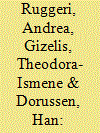

|
|
|
|
|
| Publication |
2013.
|
| Summary/Abstract |
How many peacekeepers are needed to keep the peace? Under what conditions are local governments and rebel forces more willing to cooperate with an intervention force? From a theoretical perspective in which the main role of peacekeepers is to assist local actors in overcoming their commitment problems and mistrust toward each other, it follows that sufficiently robust missions should positively affect levels of cooperation. Furthermore, any effect should be conditional on the local balance of power, that is, the military leverage between government and rebel forces. Relatively weak rebel groups-facing a stronger government-should be more willing to cooperate with larger missions. In the empirical analysis, using newly collected event data on United Nation (UN) peacekeeping operations from 1989 to 2005 in African civil wars, the authors find support for conditional effect of robust peacekeeping: there is more cooperation with UN peacekeepers when the rebels are weak.
|
|
|
|
|
|
|
|
|
|
|
|
|
|
|
|
| 5 |
ID:
097768
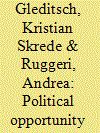

|
|
|
|
|
| Publication |
2010.
|
| Summary/Abstract |
Theories of mobilization suggest that groups are more likely to resort to violence in the presence of political opportunity structures that afford greater prospects for extracting concessions from the government or better opportunities to topple ruling governments. However, existing efforts to consider the possible influences of political opportunity structures on incentives for violence and civil war empirically have almost invariably relied upon measures of democracy to proxy for the hypothesized mechanisms, most notably the argument that the opposing effects of political accommodation and repression will give rise to an inverted U-shaped relationship between democracy and the risk of civil war. The authors detail a number of problems with measures of democracy as proxies for political opportunity structures and develop alternative measures based on the likely risks that political leaders will lose power in irregular challenges and their implications for the incentives for resort to violence. The authors evaluate empirically how the security with which leaders hold office influences the prospects of violent civil conflict. The findings indicate that recent irregular leader entry and transitions indeed increase the risk of conflict onset, while democratic institutions are found to decrease the risk of civil war, after controlling for the new measures of state weakness.
|
|
|
|
|
|
|
|
|
|
|
|
|
|
|
|
| 6 |
ID:
152331
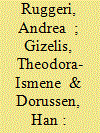

|
|
|
|
|
| Summary/Abstract |
It remains contested whether peacekeeping works. The impact of peacekeepers’ actions at the local subnational level for overall mission success has lately received critical attention. Local peacekeeping is expected to matter because it reassures local actors, deters resumption of armed hostilities, coerces parties to halt fighting, and makes commitment to agreements credible. Thus peacekeepers affect the relations between central and local elites and avoid the emergence of local power vacuums and areas of lawlessness. This study uses new subnational data on the deployment of United Nations peacekeepers. It uses matching and recursive bivariate probit models with exogenous variables for temporal and spatial variation to deal with possible nonrandom assignment of the treatment. We demonstrate that conflict episodes last for shorter periods when peacekeepers are deployed to conflict-prone locations inside a country, even with comparatively modest deployment. The effect of peacekeeping on the onset of local conflict is, however, less clear cut.
|
|
|
|
|
|
|
|
|
|
|
|
|
|
|
|
|
|
|
|
|